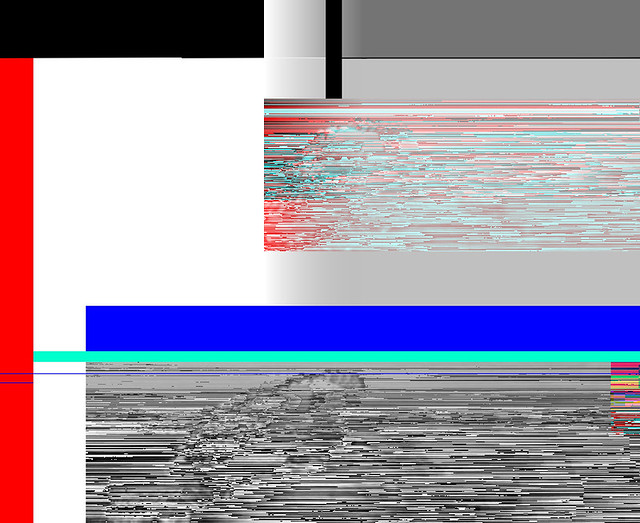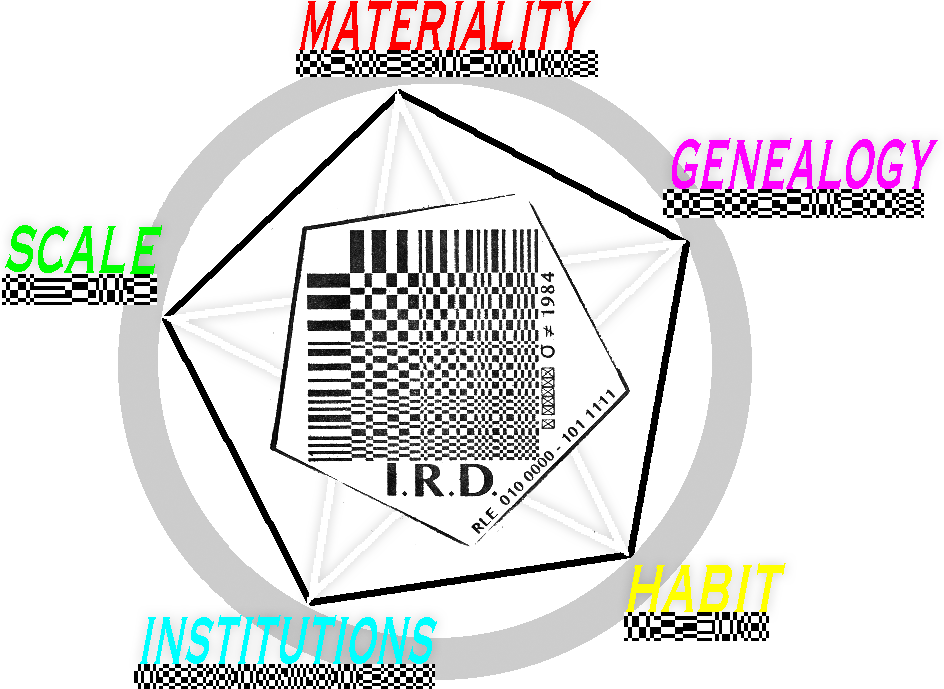
Following the last post about publications in languages I dont master, here is another text; an interview with Daniela Cotimbo from Italy, for the luxflux website. There was one specific question about the future (of glitch) that I have been asked over and over and that is still very hard to answer, that I will rewrite here. For the rest of the Italian interview you could check the luxflux website through google translate.
Daniela Cotimbo: What were your overall impressions at the Transmediale festival (February, 2011) and what is the future for media relations?
Rosa Menkman: In general, people asked a lot of questions in the festival; the festival was centered around liveness, what boundaries are there to acceleration and what responsibilities come with the future, politics, the power of data, new flows, materialities, openness, control and freedom?
Besides questions focused on ‘the future’ or movement, there were a lot of inquiries about (preserving) the past; about media archeology, curating, preservation and archiving. The answers given to questions where many and very different, although not mutually exclusive, sometimes almost opposing. In general I think these kinds of electronic art festivals demonstrate how complex and multi-layered the field of media relations has become.
The Transmediale festival build up a core framework that gave space to some of the different dynamic structures or sets of genre based codes or conventions for research (libraries) that try to tackle the questions from their own perspectives or agendas; there were (amongst others) the tech (or HacKaWay) zone, the bodily/biomedic zone, a media histories based part and a zone that focused on interfaces.
This is why, after Transmediale I think it is not possible to voice one singular answer to any of the questions asked. The festival instead offered a (partial) framework to research the old questions and develop new questions about media relations.
I think the future of festivals and conferences lies in offering these kinds of open frameworks from which new and old questions can be developed and/or answered. Besides this, these festivals will continue to give an insight into how the different audiences, like for instance artists and theorists incorporate or handle the libraries of these open frameworks in their working methods.
Personally, people often ask me what the future of glitch is. I think this is a very interesting question, because it touches on the tension that is inherent to glitch; the tipping point of failure or the turning point on which an unexpected, unaccepted outcome becomes appropriated and accepted. I don't know the future of glitch, but I believe (and hope) that the futures of glitch can be found in places where both researchers and artists work together to create unique, unstable or flexible, ever changing frameworks that both generate and answer new questions about media relations.
Right now, I am researching and trying to draft the shape of the current framework(s) of glitch art-/-research. I believe that the different glitch events, like GLI.TC/H 2010 and hopefully GLI.TC.H 2011 will give an opportunity to draft new open frameworks and give space to implement unexpected dynamic libraries from other unconventionally coupled research frameworks or canons. I hope that these new frameworks will finally become more widely accepted paradigms within media theory-/-art-/-histories.
Daniela Cotimbo: What were your overall impressions at the Transmediale festival (February, 2011) and what is the future for media relations?
Rosa Menkman: In general, people asked a lot of questions in the festival; the festival was centered around liveness, what boundaries are there to acceleration and what responsibilities come with the future, politics, the power of data, new flows, materialities, openness, control and freedom?
Besides questions focused on ‘the future’ or movement, there were a lot of inquiries about (preserving) the past; about media archeology, curating, preservation and archiving. The answers given to questions where many and very different, although not mutually exclusive, sometimes almost opposing. In general I think these kinds of electronic art festivals demonstrate how complex and multi-layered the field of media relations has become.
The Transmediale festival build up a core framework that gave space to some of the different dynamic structures or sets of genre based codes or conventions for research (libraries) that try to tackle the questions from their own perspectives or agendas; there were (amongst others) the tech (or HacKaWay) zone, the bodily/biomedic zone, a media histories based part and a zone that focused on interfaces.
This is why, after Transmediale I think it is not possible to voice one singular answer to any of the questions asked. The festival instead offered a (partial) framework to research the old questions and develop new questions about media relations.
I think the future of festivals and conferences lies in offering these kinds of open frameworks from which new and old questions can be developed and/or answered. Besides this, these festivals will continue to give an insight into how the different audiences, like for instance artists and theorists incorporate or handle the libraries of these open frameworks in their working methods.
Personally, people often ask me what the future of glitch is. I think this is a very interesting question, because it touches on the tension that is inherent to glitch; the tipping point of failure or the turning point on which an unexpected, unaccepted outcome becomes appropriated and accepted. I don't know the future of glitch, but I believe (and hope) that the futures of glitch can be found in places where both researchers and artists work together to create unique, unstable or flexible, ever changing frameworks that both generate and answer new questions about media relations.
Right now, I am researching and trying to draft the shape of the current framework(s) of glitch art-/-research. I believe that the different glitch events, like GLI.TC/H 2010 and hopefully GLI.TC.H 2011 will give an opportunity to draft new open frameworks and give space to implement unexpected dynamic libraries from other unconventionally coupled research frameworks or canons. I hope that these new frameworks will finally become more widely accepted paradigms within media theory-/-art-/-histories.



No comments:
Post a Comment